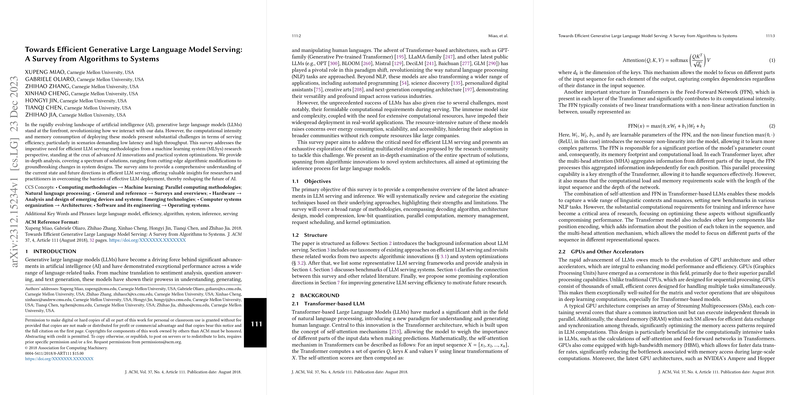Towards Efficient Generative LLM Serving: An Expert Overview
The paper "Towards Efficient Generative LLM Serving: A Survey from Algorithms to Systems," authored by Xupeng Miao et al., from Carnegie Mellon University, offers a detailed exploration of efficient serving methodologies for generative LLMs. This overview aims to summarize key insights, methodologies, and findings discussed in the paper, catering to an audience of experienced researchers in the domain.
Introduction
Generative LLMs, fueled by Transformer-based architectures like GPT, LLaMA, and others, have advanced significantly, showcasing superior performance across various NLP tasks. Despite their success, the serving of these models poses profound computational and memory challenges, particularly concerning low-latency and high-throughput requirements in practical applications. The paper methodically addresses these challenges by exploring algorithmic modifications and system-level optimizations.
Taxonomy of LLM Serving Techniques
The paper categorizes the strategies for efficient LLM serving into two primary classes: Algorithmic Innovations and System Optimizations. This structured approach highlights the diverse methodologies aimed at optimizing LLM inference.
Algorithmic Innovations
- Decoding Algorithms:
- Non-autoregressive Decoding: Techniques such as Parallel Decoding, which reframe the decoding process to allow multiple tokens to be generated in parallel, significantly reduce decoding latency but require careful management of token dependencies to maintain output quality.
- Speculative Decoding: Methods like SpecInfer enhance decoding parallelism by predicting multiple tokens in advance and verifying them concurrently, improving throughput without compromising output accuracy.
- Early Exiting: Employs internal classifiers to output predictions at earlier layers of the model, reducing computation for simpler queries.
- Cascade Inference: Utilizes a hierarchy of models to process queries selectively, deploying large models only when necessary for complex requests.
- Architecture Design:
- Configuration Downsizing and Attention Simplification: Techniques such as reducing model layers and simplifying attention mechanisms to lower computational intensity while preserving essential context understanding.
- Activation and Conditional Computing: Innovations like multi-query attention (MQA) and Mixture of Experts (MoE) architectures optimize memory and computation by selectively activating model components based on the input.
- Model Compression:
- Knowledge Distillation: Training smaller models under the guidance of larger ones, achieving efficiency gains while retaining performance.
- Network Pruning: Structured pruning techniques that selectively remove components of the model to reduce memory overhead and enhance inference speed without extensive retraining.
System Optimizations
- Low-bit Quantization:
- Employing techniques like Post-Training Quantization (PTQ) and Quantization-Aware Training (QAT) to reduce model precision requirements, significantly decreasing memory consumption and accelerating inference on hardware optimized for these formats.
- Parallel Computation:
- Model Parallelism: Leveraging strategies like tensor parallelism, pipeline parallelism, and sequence parallelism to distribute computational tasks across multiple GPUs or nodes.
- Decentralized Inference: Distributed LLM inference over a network of voluntary nodes, enhancing resource utilization and scalability.
- Memory Management:
- Sophisticated memory allocation strategies like paged attention and tree attention to manage the KV cache dynamically, optimizing memory usage and reducing redundancy during inference.
- Request Scheduling:
- Iteration-level Scheduling: Scheduling inference tasks at the granularity of iteration rather than at the request-level to improve resource utilization and throughput.
- Dynamic Batching and Preemption: Techniques to handle variable output lengths and prioritize shorter queries to balance load effectively.
- Kernel Optimization:
- Kernel Fusion and Tailored Attention: Fusing multiple operations into singular high-performance kernels and customizing GPU kernels to optimize attention calculations.
- Sampling Optimization: Efficiently handling large vocabularies and implementing hierarchical sampling strategies to accelerate token generation processes.
Overview of Software Frameworks
The paper also presents a comparative analysis of several cutting-edge open-source LLM serving systems, such as FasterTransformer, vLLM, and TensorRT-LLM, along with their specific optimizations and areas of focus. These frameworks encapsulate various algorithmic and system-level techniques discussed, serving as practical implementations for efficient LLM deployment.
Future Directions
The paper acknowledges the ongoing evolution of LLM technologies and proposes several future research directions:
- Hardware Accelerator Development: Emphasis on the co-design of hardware and software to exploit full potential efficiency gains.
- Advanced Decoding Algorithms: Further exploration of speculative and parallel decoding techniques to balance quality and performance.
- Long-sequence Optimization: Innovations in handling longer contexts to meet the demand of sophisticated LLM applications.
- Alternative Architectures: Investigation into non-Transformer architectures like MLP-based models or recurrent units for potential efficiency improvements.
- Complex Deployment Environments: Strategies for deploying LLMs across diverse environments including edge, hybrid, and decentralized systems, addressing unique challenges associated with each.
Conclusion
This comprehensive survey by Miao et al. provides valuable insights into the current methodologies and future directions for efficient generative LLM serving. By systematically analyzing both algorithmic and system-level strategies, the paper offers a robust foundation for ongoing research and development, aimed at overcoming the inherent challenges of deploying large-scale LLMs in real-world applications. The continuous integration of these optimizations will be pivotal in enhancing system performance, facilitating broader accessibility and practical use of advanced AI technologies.
